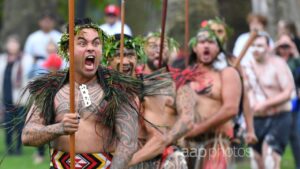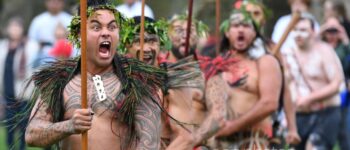1819: Maori Invasion of Rotuma
February 5, 2024
By AHNZ
 Rotuma is a small island north of Fiji with its own ethnic identity though part of Fiji. By the 1830s it had become a whaling port so English was widely spoken there. The natives were subject to Tongan invasion and civil wars, especially in the 1870s, which were only coloured by the competing Catholic and Wesleyan missions decades before. Like the Maoris, Rotumans became tired of conflict and requested the British annexation granted them in 1881.
Rotuma is a small island north of Fiji with its own ethnic identity though part of Fiji. By the 1830s it had become a whaling port so English was widely spoken there. The natives were subject to Tongan invasion and civil wars, especially in the 1870s, which were only coloured by the competing Catholic and Wesleyan missions decades before. Like the Maoris, Rotumans became tired of conflict and requested the British annexation granted them in 1881.
It must be from these whaling days that Reverend Richard Taylor’s interesting observation below comes.
Taylor was a famous CMS Missionary to New Zealand but was stuck in limbo with his family for over 3 years in Sydney before he could get started. Rev. Taylor made a, or the, final copy of the Treaty of Waitangi and wrote many books about New Zealand. He kept an illustrated journal all his life which was collated in the 1950s and typed out. Auckland War Museum has it but there seem to be copies at Wanganui and Canterbury Museums. Unfortunately these journals are unpublished because they would certainly increase the resolution of much of our early history.
In his book The past and present of New Zealand; with its prospects for the future (1868,) Taylor opened with the following quote…
“Perhaps it is not too much to say, that war was chiefly carried on that they might indulge in their cannibal feasts; and living in an island so destitute of land animals, we see, perhaps, the true origin of this horrid practice, although their traditions assert the contrary, and alarm that it was first done to strike terror into their enemies. A corroboration of this idea is to be found in a circumstance which occurred since whalers visited these islands. One of these vessels was induced to land a small party of Maories on the Island of Rotuma. In order to strike terror into the comparatively unwarlike inhabitants, the invaders killed some of them, plucked out their eyes and swallowed them, and eat their hearts. The natives were so horror-struck, that though many times more numerous than their visitors, they submitted themselves entirely to them, and were henceforth treated as their slaves. A similar thing occurred when some of the Maories were in a like manner taken to the Chatham Isles…” – Taylor (1868)
 It appears that Rotuma was once invaded by a group of Maoris using the convenience of Western shipping in much the same way the Chatham Islands were invaded and also Akaroa during the same time period.
It appears that Rotuma was once invaded by a group of Maoris using the convenience of Western shipping in much the same way the Chatham Islands were invaded and also Akaroa during the same time period.
Taylor’s story seems to match events of 1819 as related by French scientist Rene Lesson who arrived at Rotuma from New Zealand in 1824. He notes one of the great civil wars from 5 years before his arrival that was decided in a battle of mass slaughter. And…
“Some time before this war, Rotuma was attacked by cannibals from an island called Noué, some three or four days sailing away. The aggressors were defeated and fled, leaving behind some of their members who are still in slavery….The inhabitants of Rotuma know their neighbor islands and have some rare communications with Fiji and Tonga. They were able to give very little information about the island called Noué which they indicated was three or four days sail or two hundred miles east-north-east of Rotuma. It is as large and high as Rotuma, separated from a second island by a narrow channel. The inhabitants are cannibals, but of the same race and a slightly darker complexion.” – Voyage autour du monde entrepris par ordre du Gouvernement sur la corvette La Coquille, Rene Lesson (1826)
It appears that Taylor and Lesson are both writing about the same Maori invaders during or prior to 1819. And, I flatter myself that nobody has put these two quotes together until now.
After the end of the East India Company monopoly in 1801 there was sea traffic of thousands of ships exploring the Pacific and looking for whales. New Zealand got busy and there was plenty going on for generations before the Treaty. Ref. 1800s: New Zealand Not Quiet, AHNZ
“Noue” appears to be the Rotuma name for New Zealand. Before this ‘Aotearoa’ business was concocted the Maoris (as in the Treaty) called it Nu Tirani too, which isn’t far off. Especially if you allow for a regional Rotumanian dialect and the fact that their English teacher was trying to pluck their eyes out and eat their hearts!
Nu Tirani wasn’t as close nor North-East as Lesson recorded. But the islanders knew it wasn’t Tonga or Fiji. This ‘lost’ island of Noue was surely New Zealand. The cannibal attacks mentioned were the same incident. According to Taylor there was an initial success but Lesson’s story indicates that the invasion was abandoned, with losses.
Perhaps the Maori invaders returned to Noue/New Zealand and took what they came for? Perhaps they took goods and slaves away with them and their own version of the story would sound like a victorious Viking raid with a few fallen heroes? But to the Rotumanian the invaders failed and were driven off.
The natives can perhaps be forgiven for being prideful to think their own island was as big as New Zealand when it’s not. But it’s accurate to say that ‘Noue’ is separated by a another island by a (narrow) channel; Cook Strait.
No wonder, then, that the Maori Missionaries to Rotuma of 1828, Petera and Ruatangaere, didn’t make any conversions. Ref. Mana (1977,) Papers Past and Mana (1977,) Papers Past
There appears to be some more history of Maori immigration to Rotuma from the turn of the last century. So, it’s quite possible there’s more to learn about Maori-Routma relations and why it is that Maoris are so attracted to this fairly remote place.
Ref. Voyage Médical Autour du Monde Exécuté sur la Corvette du Roi La Coquille, Commandée par M.L.I. Duperrey Pendant les Années, translated from the French by Ella Wiswell, Rotuma.net
2 thoughts on "1819: Maori Invasion of Rotuma"
Leave a Reply
 Like Comment Share
Like Comment Share






Really enjoyed this, those papers of Rev Taylor sound fascinating. Great research and your conjecture could form further research for someone in the future. Certainly Maori enjoyed the taste of human flesh. It was sampled rarely which probably made the pleasure greater. It was the introduction of the pig that took the pressure off cannibalism, just like the industrial revolution took the pressure off slavery. Great article.
Cheers. I’m glad to have a way to share these observations since I’m making them in any event!